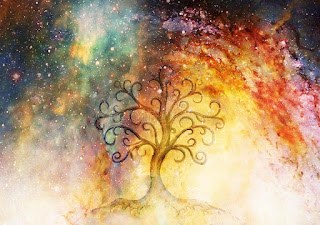Religious Ceremonies and Psychedelics
Going back to when the ‘word’ was passed down orally, mind-altering substances have been mixed in with religion. In the second millennium BC, Indo-Aryan tribes partook of a fermented drink called ‘soma’ that R. Gordon Wasson postulated had the "fly agaric" mushroom sprinkled in. Whatever was in it, the Vedas tells us it was a drink the gods themselves drank, which made the worshippers feel closer to their deities. They even named their drink after one of the gods, “Soma.” Or maybe their god was named after the drink. Either way, they were drinking a conduit to their god.
These ancient gods were wilder than the typical concept of God today. “Soma” (the god) would have been comfortable hanging out with the Greek party god, Dionysus, and his Roman counterpart, Bacchus. When reading descriptions of Dionysus ceremonies, I picture a rave minus the glow sticks. There was dancing and drinking and, yes, the ingesting of psychoactive potions. There was over-indulgence and debauchery to be sure, but the true followers were attempting to shake off fears and insecurities and escape back into nature, if only for a little while.
A contemporary of the Dionysus Cults was the Eleusinian Mystery Religion. While they worshipped from the same Olympian family, they favored Demeter and her daughter, Persephone. Quick backstory: Hades kidnapped Persephone and abducted her to his underground world to rule as his bride. Demeter pulled strings, got Zeus to intervene. Hades coughed Persephone up, but tricked her at the last second to spend winters with him. So, when the cold comes and the crops die, Persephone is underground with the king of Hades.
The annual festival of the Eleusinians culminated with fasting and a marathon walk to the temple. Perhaps while watching a reenactment of the Demeter story, the initiates were given a hallucinogenic drink that Homer referred to as “Kykeon." Like Soma, this provided a direct experience with their gods. While some may be cynical about the reliability of ‘drug-induced visions,’ these were people making a concerted effort to get in touch with the Divine, and succeeded for two thousand years.
For the next two millennium, Christianity and Islam rose in dominance, but trends can shift quickly. In 1999, 70% of the US said they were members of a church, synagogue, or mosque. Today, that number is below 50%. This does not mean that people still don’t want a spiritual experience, it just means they are not always finding it in their places of worship. What would it look like if, once a year, the Southern Baptists danced with abandon and became one with nature? Or the Presbyterians had their ego shredded? Or the Catholics came face to face with the Father, Son, and Holy Spirit?
Of course, society and religious institutions are not about to endorse such radical, heretical behavior. The 1960s were a great social experiment with mind-expanding drugs (ie LSD) playing an integral part. Yes, there was abuse, which happens when no structure or guidance is provided. It was also a time when the younger generation dared to defy their elders. Men refused to fight a war. Women were empowered. Black people stood up and demanded to be counted. Some even say the Apple seeds for Silicon Valley were planted in the psychedelics of the sixties.
A half a century later, serious research is being done again on psychedelics (such as psilocybin from mushrooms) by serious scientists (such as Roland Griffiths) at serious institutes (like John Hopkins). These are experiments aimed at the addicted, depressed, and those dealing with end-of-life issues. The results are positive and often trounce current standard-of-care. Of course, these experiments are only for those that are suffering from a malady. But what about ‘healthy/normal’ individuals? Wouldn’t society benefit from a mystical experience too?
People will always seek answers to life’s big questions, and hallucinogens can be a beneficial shortcut, especially when taken with guidance and respect. The experiences and insights brought on by psychedelics stay with the participant long after the psychoactive agent has worn off. And because it feels like revealed knowledge, it can often have a profound, life-changing effect. There is much work to be done, but I believe these ancient medicines have more to teach us about ourselves and how we can make our world a better place.
If you would like to get my next piece on “Early Christianity and Entheogens," you can subscribe Here. My speculative fiction book, Terminus, is a near-future retelling of the Eleusinian Mysteries.


Comments
Post a Comment